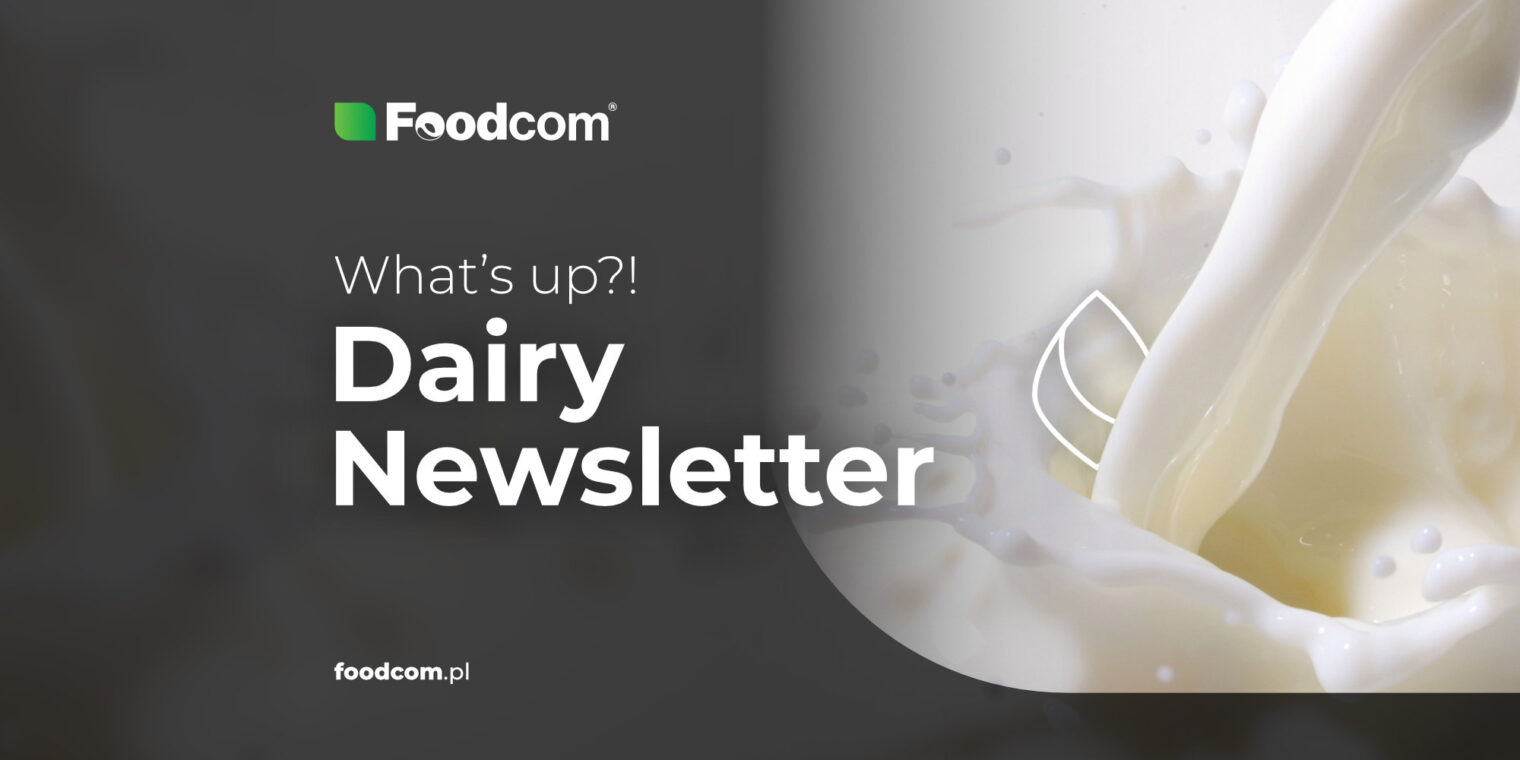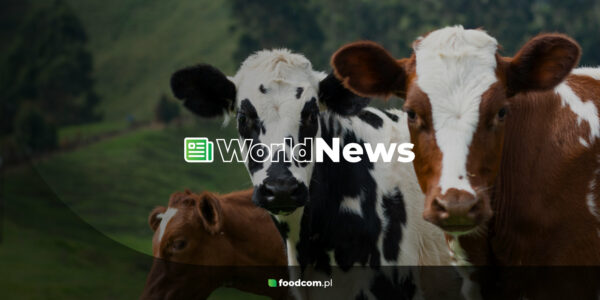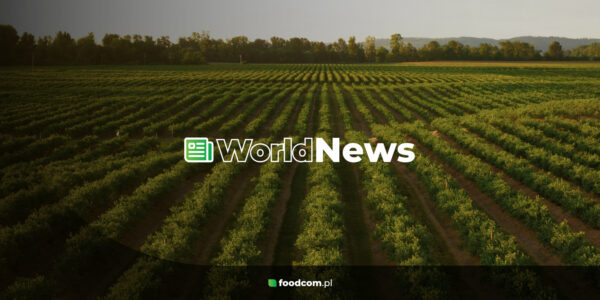The price of Cream is rising in general. There’s nothing better than starting an article with a strong opening, right? The increase in the price of Cream affects the overall situation of the dairy sector. Butter and Anhydrous Milk Fat, among others, have seen price increases over the past week. It’s not hard to guess how rising prices will affect demand.
Although potential buyers are taking their time with their purchases, there is a light at the end of the tunnel. In fact, buyers around the world are beginning to accept higher product prices, leading some to hope that the current downward trend in demand will soon be reversed.
In addition to the typical description of the situation of individual products recently, in this edition of the newsletter you will find: a decrease in the number of dairy farmers in the United Kingdom, changes in prices on store shelves in Romania, the development of new technologies used in the dairy industry, the construction of new factories, fluctuations in imports and exports, and much, much more. Do you want to be up-to-date on everything important in the dairy sector? Then be sure to read on!
Continue reading to learn about this week’s market insights.
With us, you’ll never miss a thing!
Butter
Last week, Polish Butter was no longer competitive with Western producers, especially Irish, due to the higher price of fat and currency rating. The prices of the product from these two producing countries increased and converged. Customers, seeing the drastic price increase, did not buy in volume to confirm the upward trend, the continuity of the increase. Given the general instability of Butter, it is not certain that consumers will accept a 10% higher price, increasing from week to week.
Skimmed Milk Powder
As we highlighted in the last issue of the newsletter, upward trends continue unabated. Cheap raw material from the West is no longer as visible in the market, and we see quotes across Europe in the green. Regardless of the recent higher prices of Skimmed Milk Powder being concluded on the world tenders, we believe this is the perfect place and time for the creameries to be able to supply the world in the milk powder sector.
Gouda/Edam
Those who read our dairy newsletter 4–5 weeks ago will have the impression that the market is ‘in the same place,’ with good availability of products and not the strongest demand from around the world. Nevertheless, procurement still buys when it needs to secure the goods for production and not to replenish their stocks.
Full Cream Milk Powder
Full Cream Milk Powder has followed the trend of Skimmed Milk Powder. The product has seen a price increase on dairy platforms in the last 2 weeks and has seen some demand on the European continent. Availability is not particularly high, as Europe has not seen higher spot demand in the last 6 months that would make the product appear to be in demand.
Cream
Cream strengthened across Europe last week. For other liquids, including Skimmed Milk Concentrate, the situation was similar in European countries, their prices also increased and they strengthened their position.
What else?
Europe
The number of dairy farmers in the UK is declining
The latest AHDB survey indicates that the number of dairy farmers has fallen by nearly 5%, or 380 producers, in the past 12 months, compared with April 2022. Historically high production costs are cited as the main reason for leaving the industry, despite easing inflation. An additional burden on producers is falling milk prices. As a result, some are virtually forced out of the business.
Milk prices in Romania have dropped by 20%
An agreement was successfully negotiated between the government and representatives of retailers, processors and farmers, as a result of which milk prices on the shelves have declined by an average of 20%. For some products, the reductions were as high as 34%. The aim of the agreement was to increase sales of fresh milk from Romania, which had declined due to competition from cheaper imported milk. Under the plan, the price cuts will be borne by retailers and processors and will not have a negative impact on farmers.
Turkey’s milk production is growing
In March, 912 000 tons of cow’s milk were collected, up 6.2 percent compared to the same month last year. Production of drinking milk increased by almost 11 percent year-on-year to 139 000 tons. 99 000 tons of yogurt were produced, 2.9 percent more than last year. Cheese production increased by 3.4 percent to 67 000 tons. Production of Ayran, a local yogurt drink, fell 2.9 percent to 61 630 tons.
The Americas
The startup MyAnIML™ is constantly developing solutions to take care of herd health
The system developed by the company uses, among other things, a special muzzle that uses artificial intelligence to monitor and analyze changes in the cow’s mouth, enabling early detection of diseases and illnesses. Among the latest solutions added to the offering are ear tags for cattle, which make it even easier to find a sick cow and isolate it earlier. This saves farmers time and also reduces the preventive use of antibiotics. We repeat the question: How could people do anything at all without all these devices and systems?
Uruguay’s dairy exports are on the rise
According to the latest data, milk exports in April increased by almost 30% compared to the same period in 2022. The value of Uruguayan milk exports in April was $70 million. In addition, revenues in the first quarter were the highest since 2014, with the largest increase in milk exports to the Brazilian market, while the largest decrease was in milk exports to Algeria.
Fairlife will build a new plant in New York
The company, which is part of Coca-Cola, specializes in the production of ultra-filtered milk and sells its products in Canada, the United States and China. Fairlife has decided to build its new plant in New York State. Construction is scheduled to begin this fall and be completed before 2025. The area was chosen because of its proximity to markets and highly skilled workforce. The investment is expected to contribute to the development of the region, where the dairy industry has begun to decline.
Asia & Oceania
China is importing less Polish milk
Milk exports from Poland to China have decreased by as much as 66% in the first two months of this year compared to the same period last year. The main reason cited for this is the intense promotion of domestic milk and dairy products in China. Many are hoping for a reversal of this trend due to the general increase in imports in China following the move away from the zero-COVID policy.
Japanese dairy in crisis
Bankruptcies among Japanese raw milk producers reached their highest level in a decade in 2022. The factors that contributed most to this situation were the war in Ukraine and the weak yen, which contributed to a significant increase in livestock feed prices and general production costs. Demand was already low due to the impact of the pandemic, and labor shortages were already occurring beforehand. Many breeders had no other choice and were forced to abandon their activities.
South Korea is culling cattle after a disease outbreak
South Korean authorities have ordered the slaughter of several hundred cattle and introduced biosecurity measures after cases of foot-and-mouth disease were confirmed on farms in the central part of the country. This is the first confirmed outbreak of the disease since early 2019, and a special team has been dispatched to investigate the outbreak, disinfect farms in the area, and impose a 48-hour halt to the movement of people and livestock in the affected area.








